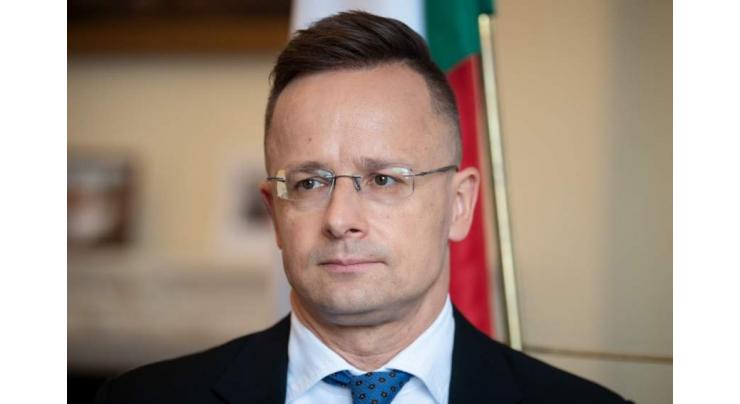
Hungary Calls External Obstacles To Construction Of NPP Violation Of Sovereignty
Mohammad Ali (@ChaudhryMAli88) Published September 12, 2022 | 07:15 PM

Hungary perceives institutional obstacles posed by the EU to the construction of the Paks nuclear power plant (NPP) as a violation of its sovereignty and a threat to the stable energy supply, Hungarian Foreign Minister Peter Szijjarto said on Monday
BUDAPEST (UrduPoint News / Sputnik - 12th September, 2022) Hungary perceives institutional obstacles posed by the EU to the construction of the Paks nuclear power plant (NPP) as a violation of its sovereignty and a threat to the stable energy supply, Hungarian Foreign Minister Peter Szijjarto said on Monday.
Earlier in the day, Szijjarto urged the European Commission to guarantee that nuclear energy does not fall under sanctions against Russia as outlined in the first package of Brussels sanctions.
"Slowing down and preventing investment in nuclear energy is practically damaging the sovereignty of European countries. One of the most important components of sovereignty is the security of energy supply ... In Hungary, from this point of view, nuclear energy and investment in Paks are crucial, so those institutions, banks, or bodies that slow down or interfere with the construction of new units of the Paks nuclear power plant are practically violating the sovereignty and energy supply of Hungary," Szijjarto said at the 7th Central & Eastern Europe Nuclear Industry Congress.
In late August, the Hungarian Atomic Energy Authority (HAEA) issued a number of permits for the construction of the fifth and sixth units of the Paks-2 NPP.
Hungary's only nuclear power plant, Paks, generates almost half of all electricity in Hungary, with the share expected to double after the planned commissioning of two new NPP's reactor units. The Hungarian leadership has repeatedly emphasized that nuclear energy is a way to ensure the country's energy security.
In late 2014, Russia and Hungary signed an agreement on the construction of two additional advanced reactors. The sides agreed that Russia would allocate 10 billion Euros ($10 billion) in a loan to finance the construction of the units.
Related Topics
Recent Stories

Currency Rate In Pakistan - Dollar, Euro, Pound, Riyal Rates On 26 April 2024

Today Gold Rate in Pakistan 26 April 2024

ICC Womens T20 World Cup Qualifier, Match 2: Ireland Women open with Comfortable ..

Robinson, bowlers help New Zealand go 2-1 up against Pakistan

Shahzeb Chachar to hold khuli kachehri on April 26

Heatwave amid Israel's aggression in Gaza brings new misery, disease risk

Tourism must change, mayor says as Venice launches entry fee

Court adjourns Judicial Complex attack case till May 17

Nasreen Noori’s book ‘Popatan Jahra Khwab’ launched

Wafaqi Mohtasib inspection team visits Excise and taxation office

AJLAC announces 5th Conference titled ‘People’s Mandate: Safeguarding Civil ..

Pak-US officials engage to enhance trade, investment ties
More Stories From World
-
Miner Anglo American rejects BHP's $38.8 bn takeover bid
10 minutes ago -
Guatemala prosecutors raid international NGO over alleged child abuse
20 minutes ago -
Another State Dept official resigns over US' Gaza policy amid growing student protests
20 minutes ago -
Togo leader Gnassingbe follows father's political playbook
30 minutes ago -
China ready to work with Pakistan to promote practical cooperation under CPEC, GDI: Luo Zhaohui
40 minutes ago -
Indian election resumes as heatwave hits voters
40 minutes ago
-
United by grief, families of Boeing crash victims demand justice
1 hour ago -
Microsoft expands its AI empire abroad
1 hour ago -
China ready to work with Pakistan to promote practical cooperation under CPEC, GDI: Luo Zhaohui
1 hour ago -
Nuggets push Lakers to brink as Embiid's 50 points lead Sixers over Knicks
1 hour ago -
Man City in title groove as Arsenal face Spurs test
1 hour ago -
Philippine settlement submerged by dam reappears due to drought
1 hour ago